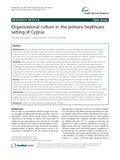| dc.contributor.author | Zachariadou, Theodora | |
| dc.contributor.author | Zannetos, Savvas | |
| dc.contributor.author | Pavlakis, Andreas | |
| dc.date.accessioned | 2015-12-18T15:26:02Z | |
| dc.date.available | 2015-12-18T15:26:02Z | |
| dc.date.issued | 2013 | |
| dc.identifier.issn | 1472-6963 | |
| dc.identifier.uri | http://hdl.handle.net/11728/6804 | |
| dc.description.abstract | Background: The concept of organizational culture is important in understanding the behaviour of individuals in
organizations as they manage external demands and internal social changes. Cyprus healthcare system is under
restructuring and soon a new healthcare scheme will be implemented starting at the Primary Healthcare (PHC)
level. The aim of the study was to investigate the underlying culture encountered in the PHC setting of Cyprus and
to identify possible differences in desired and prevailing cultures among healthcare professionals.
Methods: The population of the study included all general practitioners (GPs) and nursing staff working at the 42
PHC centres throughout the island. The shortened version of the Organizational Culture Profile questionnaire
comprising 28 statements on organizational values was used in the study. The instrument was already translated
and validated in Greek and cross-cultural adaptation was performed. Participants were required to indicate the
organization’s characteristic cultural values orientation along a five-point Likert scale ranging from “Very Much = 1”
to “Not at all= 5”. Statistical analysis was performed using SPSS 16.0. Student t-test was used to compare means
between two groups of variables whereas for more than two groups analysis of variance (ANOVA) was applied.
Results: From the total of 306 healthcare professionals, 223 participated in the study (72.9%). The majority of
participants were women (75.3%) and mean age was 42.6 ± 10.7 years. Culture dimension “performance
orientation” was the desired culture among healthcare professionals (mean: 1.39 ± 0.45). “Supportiveness” and
“social responsibility” were the main cultures encountered in PHC (means: 2.37 ± 0.80, 2.38 ± 0.83). Statistical
significant differences were identified between desired and prevailing cultures for all culture dimensions (p= 0.000).
Conclusions: This was the first study performed in Cyprus assessing organizational culture in the PHC setting. In
the forthcoming health system reform, healthcare professionals will face challenges both at organizational level and
professional status. Results of the study can serve as background knowledge for leaders and policy makers who
seek interventions to improve performance before the implementation of a new national healthcare scheme. | en_UK |
| dc.language.iso | en | en_UK |
| dc.publisher | BMC Health Services Research | en_UK |
| dc.rights | © 2013 Zachariadou et al. | en_UK |
| dc.rights.uri | http://creativecommons.org/licenses/by-nc-nd/2.0/ | en_UK |
| dc.source.uri | http://www.biomedcentral.com/1472-6963/13/112 | en_UK |
| dc.subject | Cyprus | en_UK |
| dc.subject | Primary healthcare | en_UK |
| dc.subject | Organizational | en_UK |
| dc.subject | Culture | en_UK |
| dc.title | Organizational culture in the primary healthcare setting of Cyprus | en_UK |
| dc.type | Article | en_UK |


